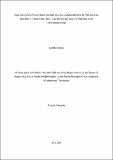| dc.description.abstract | Rabies is a disease which is most transmitted to humans through infected domestic dog bites.
The disease is preventable through mass dog vaccination (MDV) or timely access to Postexposure
Prophylaxis
(PEP)
injections
for
humans.
Accessing
a
full
course
of
PEP,
however,
is
a
challenge,
due
to
high
costs
and
lack
of
availability.
In
Africa,
rural
populations
are
most
affected
by rabies; this is also the case in Tanzania. Since the group who is most at risk of
exposure are children, emphasizing correct dog handling practices, for example, can
minimize dog bites and hence prevent disease incidences. MDV of the susceptible canine
population is the best way of breaking the disease transmission cycle, but achieving the
recommended coverage of 70% is still a challenge. To rectify this, it is important to
understand dog ownership systems, management and handling practices and the decisionmaking
process within households. The current study identified these to help addressing
constraints related to rabies prevention and control in the community. The study focused on
characteristics of dog ownership in the household (HH), decision-making process regarding
dog ownership, dog vaccination and access to PEP for a child once exposed. A crosssectional
study conducted in Kilosa district between May 2016 and March 2017, looked at
1216 households in rural communities in Tanzania. The findings elucidated significant
factors affecting dog ownership and the number of dogs kept per household. Larger
households are more likely to own dogs <0.001. While a child is likely to take the dog for
vaccination, the decision to vaccinate the dog is usually made by the father. The findings also
showed that mothers are responsible for the child's health once exposed and take the child to
access PEP. The research findings will help to understand HH decision making with regards
to dog ownership and responsibility for child health. These results are relevant for the design
and implementation of rabies interventions and other zoonoses. | en_US |

